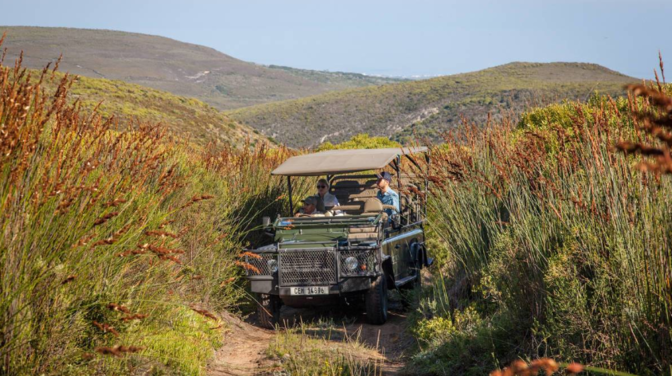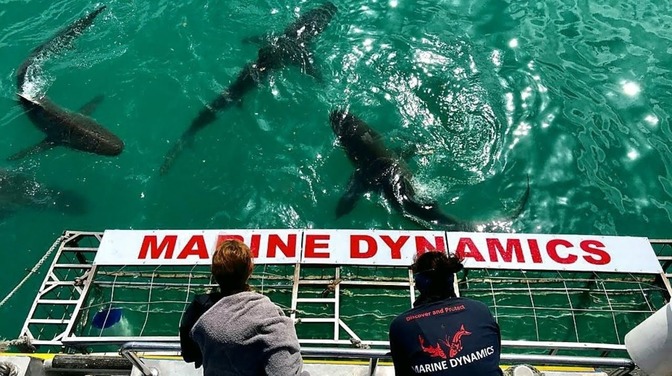The Urinal at Liliesleaf Farm
We arrived in Joburg on Friday, 17 May 2024, and returned to Pearly Beach on Monday, the 27th of the same month and year, which makes the trip an 11-day odyssey. On Day 4, Monday the 20th, Guy took us to see some of his old haunts that we had heard about over the years, and then to Liliesleaf Farm. We went in Jen’s Kia Picanto, which she generously lent us, as she was working from home that day. I not only thanked her, but Christ as well, under my breath. Guy’s 1996 Honda Prelude is a very stylish sports car with a sun roof and a powerful engine but, apart from being low on the ground, it has only two doors, and the back seat is designed to take a pair of dwarfs and not someone taller than about four foot six. When he picked us up from Lanseria on Friday, I had been required to ease myself in backwards and half lie in a contorted position with my feet behind the passenger and my upper body behind the driver. By the time we reached his complex in Linden my right leg had gone to sleep and I had bumped my head on the roof a dozen times.
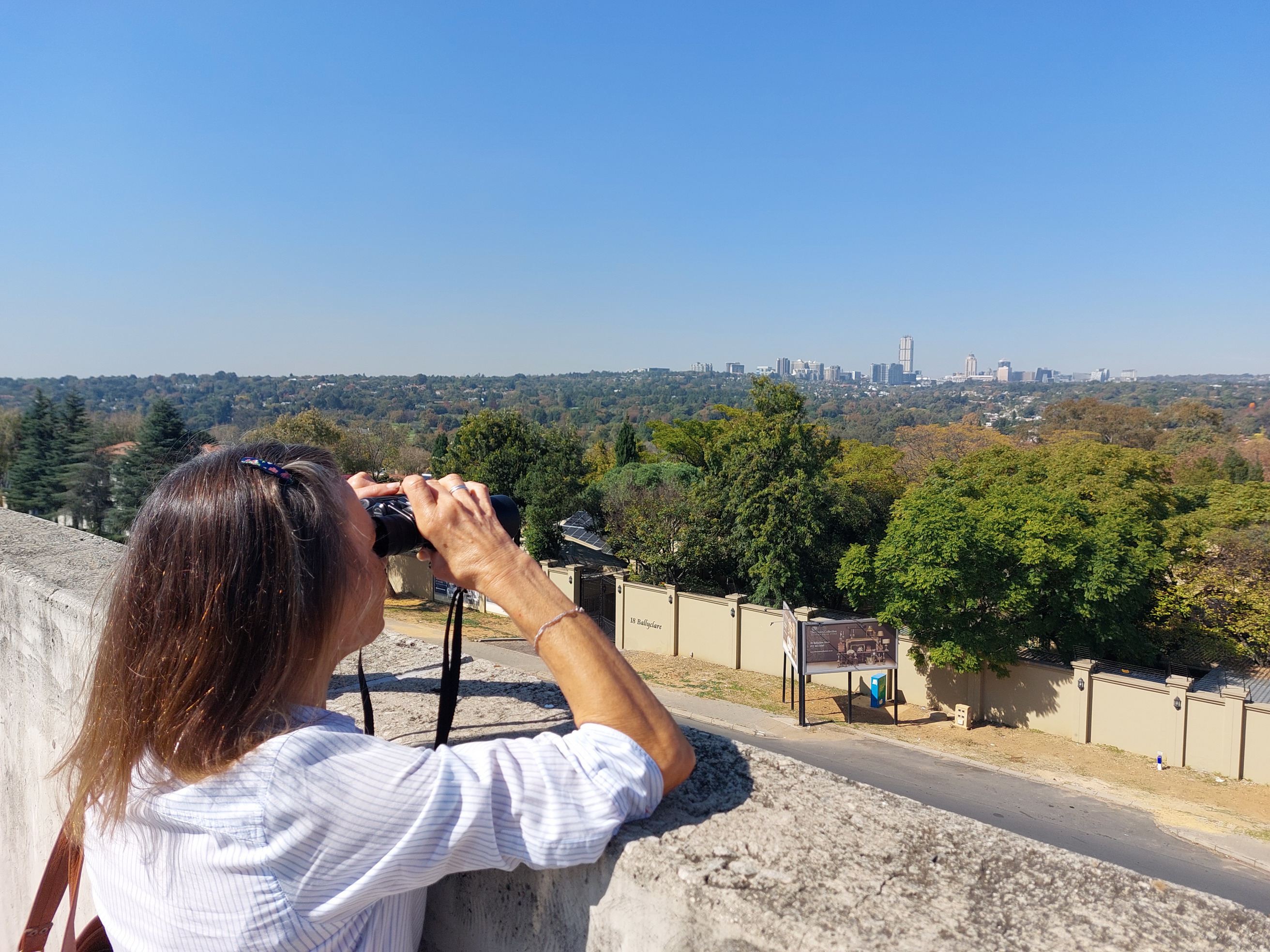
Our first stop was the parking area on top of Bryanston Mall. On our way there it became apparent that traffic in Joburg moves considerably faster than in Cape Town, and Guy drives assertively. This is a style somewhere between defensive and aggressive, but definitely closer to the latter than the former. The Mall is situated on a ridge, and there is a fine view from the parking area. We stood at the concrete parapet and surveyed the city laid out before us. Now we could see why it is known as the biggest man-made forest in Africa, with most of the houses, shops and roads obscured by a myriad trees. To the south, the high-rise buildings of Sandton stood tall above the surrounding greenery. It was around 11am on a mild, cloudless day without wind, and even the thin mantle of smog looked more decorative than toxic.
Next on the itinerary was Bryanston Crescent, where he had lived for five years before moving to Linden. Much different to what I had imagined, the place was set in large, park-like grounds surrounded by fortress fencing, of course. Blocks of flats, their design adventurously unconventional. Six three storey circular structures spaced comfortably apart, they probably dated back to the 60s or 70s, and looked solid and well maintained. Guy showed us the three-bedroom apartment he had rented, and it appeared far more salubrious than the den I had conjured in my mind in response to all the tales he had told us about the motley succession of dubious characters he had shared it with.
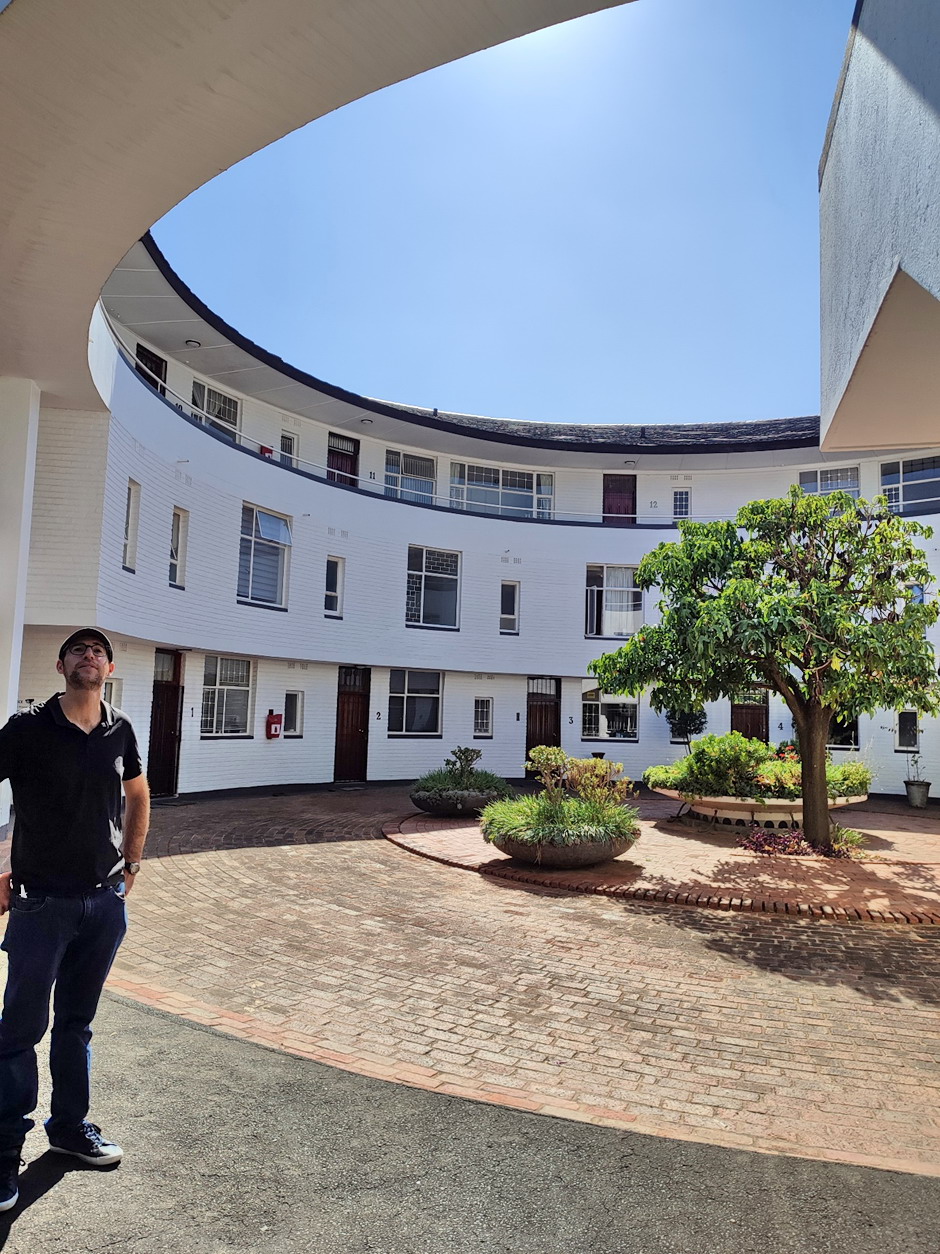
It was not far to Bantry Road, where he had lived for his first two years in Joburg. Again, it did not conform to the picture I had constructed, which was of a street in a flat area like Constantia. In fact, he had to exercise assertiveness in applying the hand brake when we stopped outside Number 29, or we would have rolled back downhill and crashed into something.
This was the house of iniquity? We were looking at a gate that was designed to withstand any attack the barbarian hordes might launch in order to overrun the inhabitants of the fortified complex. Beyond the gate lay two rows of six duplex apartments facing one another across a paved driveway. Clearly, only respectable middle-class citizens could afford to live here.
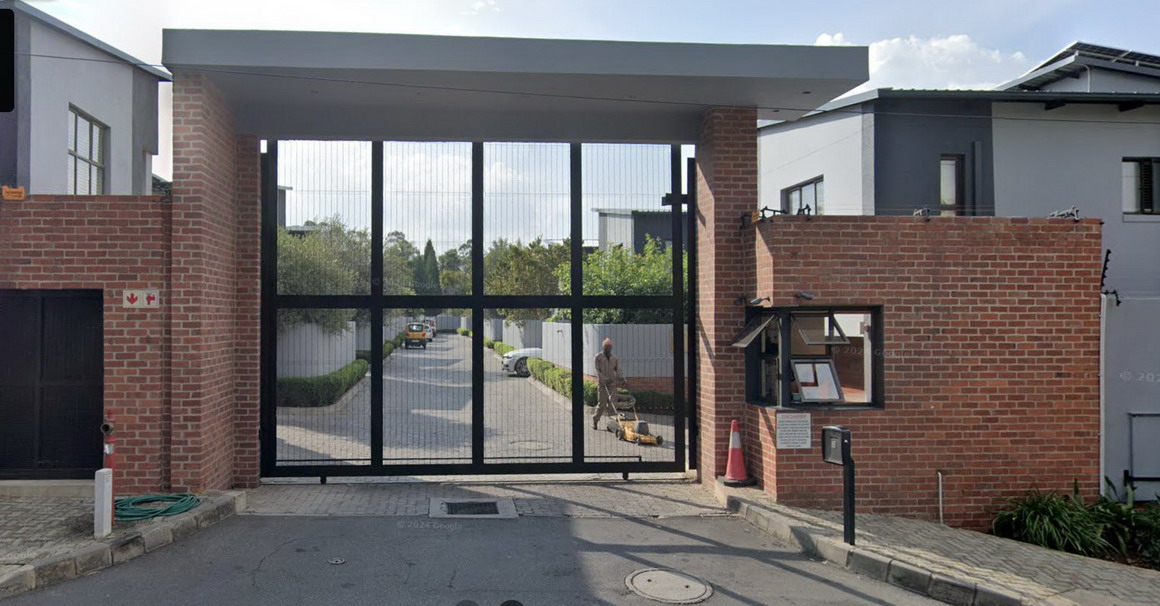
“They demolished the old house, chopped down all the trees, and bulldozed everything, including the swimming pool and tennis court. Then they built what you see here. It’s happening all over the northern suburbs, this obliteration of the past. Only the address remains.”
He sounded wistful. Not a single detail had been left to trigger memories. For that, he would have to look for photos on his phone, or search his mental archive.
“So this is where Eric gave tango classes, and the Nigerian slaughtered a goat and cooked it on the kitchen stove for a week, and you threw fire crackers into the half empty pool to stop the cacophonous bullfrogs from destroying your sleep, and you shot at the rats with your air gun, and the sex addict paid the maid to give him a hand job between her sweeping and ironing, and your phone was stolen by that sociopath, and, and, and?”
I think he was chuffed that I had remembered these events that he had shared with us
From there we drove to Rivonia along River Road and stopped to look down into the valley that carried the Braamfontein Spruit, the longest stream in Joburg that empties into the Jukskei River to the south. The grassy slopes on either side of the tree-lined spruit had been mowed, and higher up overlooking the bucolic scene were the palaces of the wealthy class. On our side, above the road, was a similar line of prime properties, all of which were fronted by three-metre-high walls topped with electric fencing. It was unlikely that any of the tycoons, business magnates and captains of industry living in these mansions would be tempted to flog their residence to a property developer. But, as Guy told us, fashions and values change all the time in this city.
We reached Rivonia and stopped in a leafy street outside a light brown face-brick building that was low-rise and did not have the appearance of a city office block. Another surprise. This was where he had worked from 2011 until Covid and, like everywhere else we had been so far, the real Joburg was proving to be far more interesting than the monotonously unprepossessing environment I had constructed in my mind’s eye.
Now for Liliesleaf. It was not far, and the approach felt like we were in the countryside, and this could well have been a farm. The parking area was empty but, as we got out, a security man approached and said the resource centre was closed on a Monday, but we were welcome to walk around.
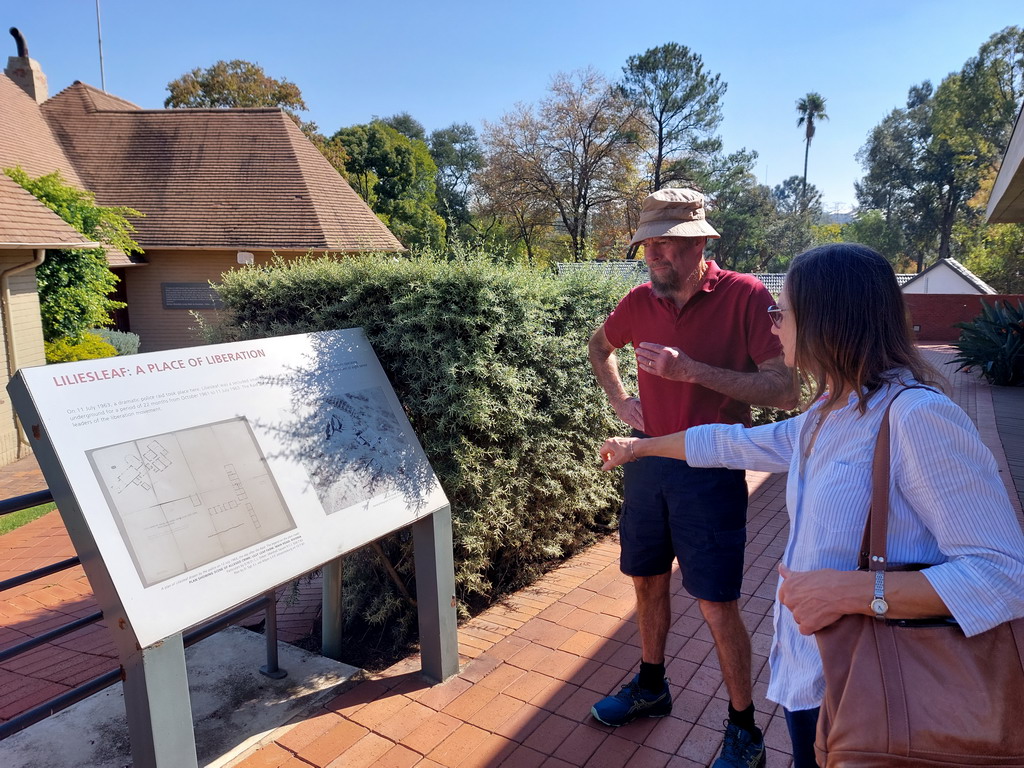
The farmstead was built on a slope, and the farmhouse and outbuildings look out to where fields and pastures once lay. As we wandered from one building to another, Krystyna read the information boards to me, and they proved most educational. To summarise what they had to say, I asked ChatGPT to discuss the history of Liliesleaf Farm and the events surrounding Mandela’s arrest. This is what it came up with:
Liliesleaf Farm, located in Rivonia, Johannesburg, holds a significant place in South African history due to its role in the anti-apartheid struggle. The farm was purchased in 1961 by Arthur Goldreich, a member of the South African Communist Party, and served as the secret headquarters of the African National Congress (ANC) and its armed wing, Umkhonto we Sizwe (MK).
Historical Background
Acquisition and Initial Use:
Liliesleaf Farm was acquired under the guise of a typical residential property, intended to conceal the true activities taking place. Arthur Goldreich and his family posed as the white owners of the farm, which allowed black activists to operate discreetly.
ANC and MK Activities:
The farm became a central meeting place for the leadership of the ANC and MK. Key figures such as Nelson Mandela, Walter Sisulu, Govan Mbeki, and Joe Slovo used the location to plan and coordinate their efforts against apartheid. Mandela himself lived on the farm under the alias David Motsamayi, posing as a gardener and cook.
Operation Mayibuye:
One of the significant activities conducted at Liliesleaf was the drafting of "Operation Mayibuye," a detailed plan to transition from non-violent resistance to an armed struggle against the apartheid regime. The document outlined strategies for guerrilla warfare and mass mobilization.
Events Leading to Mandela's Arrest
Increased Surveillance:
By the early 1960s, the South African government had intensified its crackdown on anti-apartheid activities. The ANC and MK's activities were under increased surveillance by the apartheid state's security forces.
Mandela's Capture:
Prior to the raid on Liliesleaf, Nelson Mandela had already been arrested on August 5, 1962, while travelling from KwaZulu-Natal to Johannesburg. He was charged with inciting workers' strikes and leaving the country illegally. His capture was a significant blow to the anti-apartheid movement.
The Raid on Liliesleaf Farm:
On July 11, 1963, the South African police raided Liliesleaf Farm. During the raid, several high-ranking members of the ANC and MK were arrested, including Walter Sisulu, Govan Mbeki, Raymond Mhlaba, and Ahmed Kathrada. The police uncovered a cache of documents, including "Operation Mayibuye," and other incriminating evidence that detailed the ANC's plans and operations.
Rivonia Trial:
The evidence seized during the Liliesleaf raid led to the infamous Rivonia Trial, where Nelson Mandela and other key leaders were tried for sabotage and conspiracy to overthrow the government. The trial began on October 9, 1963, and concluded on June 12, 1964, with Mandela and seven others being sentenced to life imprisonment. Mandela delivered his famous speech from the dock, declaring his readiness to die for the ideal of a democratic and free society.
Legacy of Liliesleaf Farm
Today, Liliesleaf Farm is a museum and heritage site, commemorating the sacrifices and contributions of the anti-apartheid activists who operated there. It stands as a testament to the struggle for freedom and the resilience of those who fought against the oppressive apartheid regime. The farm's preservation serves as an educational resource and a symbol of the enduring fight for justice and equality in South Africa.
We wandered through the grounds and examined the outbuildings where the dramatic events had taken place, and then looked for a public toilet before returning to the car. A rough brick building that once served as a store had been converted into a modern, well-appointed ladies and gents. I entered the cool interior and stood at the stainless-steel urinal. I had almost finished emptying my bladder when I glanced up and was startled to find myself face to face with my own reflection. There I was, holding my old organ and pissing into the silver receptacle. How extraordinary! Never before had I encountered such a feature in a public convenience. I was actually watching myself urinate! This was a brand-new experience, and it called to mind the labyrinthian mental game played by Borges in his short fictions. It was entirely feasible for someone to stand in the doorway and not only see me from both rear and front, but also to watch me watching myself, and at the same time me noticing the observer behind me. For a brief moment I imagined the arrival of a tall black man dressed like a gardener. He caught my eye in the mirror, glanced down, and said something in isiXhosa, which I took to be both humorous and mildly insulting. Then he was gone.
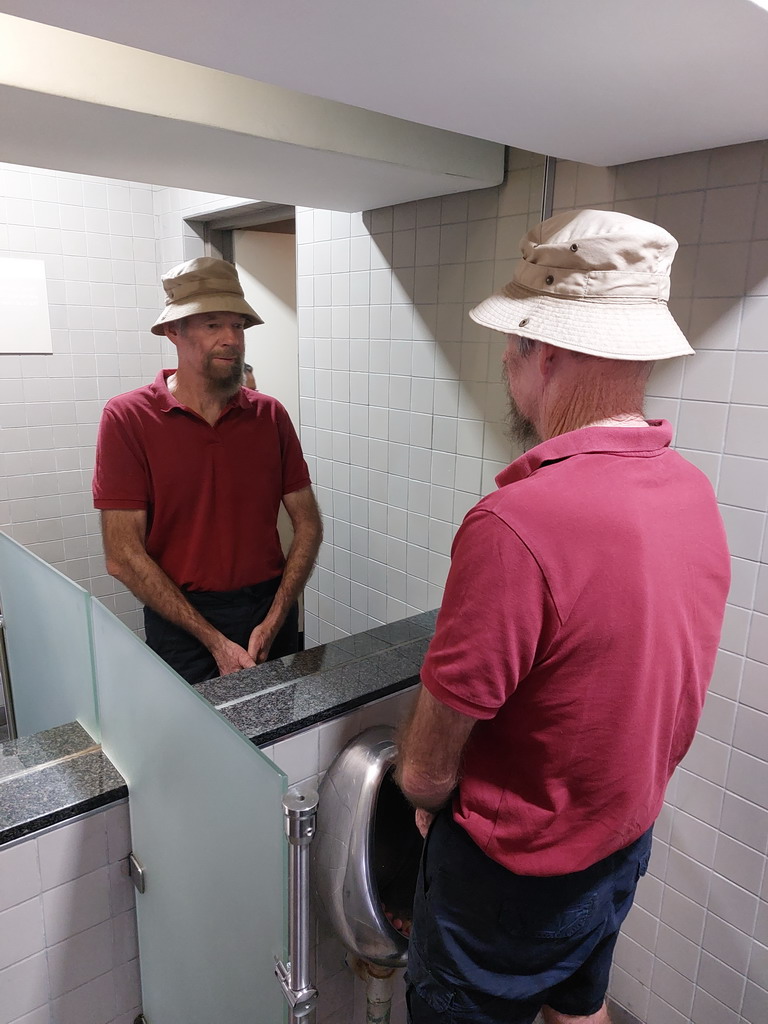
"Where to now, Guy?” I asked from the back seat as we drove away from Liliesleaf Farm.
“Alexandra township.”
“Ah, that should also be interesting. Hope we don’t get hijacked.”
To view my longer work as an author, you can find me on Smashwords here.

